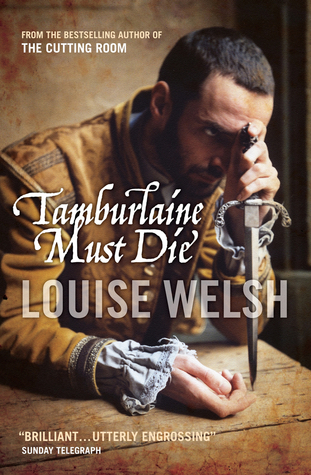I read Welsh’s first release, The Cutting Room, when the paperback was released and I read it during a day off work. Looking back, I wish I’d went to work but my only real memory of the book is that it was dull. The only interesting part, for me, was Glasgow and being able to comment on places I knew. I don’t even remember the ending or how it came about; it just happened and thought along the lines of “Whatever, almost done now!”
So, given that it was a first work, I decided to try her second, the historical novella called Tamburlaine Must Die. Here’s the blurb from the inside cover:
1593 and London is a city on edge. Under threat from plague and war, it’s a desperate place where strangers are unwelcome and severed heads grin from spikes on Tower Bridge.
Playwright, poet and spy, Christopher Marlowe has three days to live. Three days in which he confronts dangerous government factions, double agents, necromancy, betrayal and revenge in his search for the murderous Tamburlaine, a killer who has escaped from between the pages of his most violent play…
Tamburlaine Must Die is the swashbuckling adventure story of a man who dares to defy both God and State – and discovers that there are worse fates than damnation
From that you would think it was a fun bit of historical fiction rife with twists and turns, dark moments, and something to say on the topics of religion, the state, crime, and the black arts. Instead it’s a fast paced dirge bereft of anything resembling excitement or content. But, just to shock you, it has a bit of gratuitous homosexual sex to kick off the proceedings.
Whatever Welsh’s intentions were with this novella, they were most certainly not achieved. She sets the story in London, a city for which authors down the years have shown us all the nooks and crannies, but the pages are lifeless. London, who should be a character in herself, comes across as a sleepy hamlet. The novella hints at issues such as religion and politics but they are mostly background mentions, tangential to the story of Marlowe that this book deals with. And, finally, the characters, including the narrator, are lack-lustre, each one failing to leap out of the page which is hardly the stuff of a self-proclaimed swashbuckler. At the very least it could have looked deeper into the Marlowe history rather than seem like a below par version of German film, Run Lola Run, with one act.
The problem with Welsh’s writing in Tamburlaine Must Die is that she seems to rely too heavily on nouns to create pictures. So, rather than waste paper by building up an atmosphere in a dusty bookshop, for example, she just lists books and other curiosities: ballads, woodcuts, poems, romances, prayer books, etc. Despite all the people in the bookshop, there is no life in any of them.
All in all, it’s just a dull book with little to say on anything.

Ouch! I like your honesty. You write a good, sharp review. I just heard Louise Welsh read at Aye Write: it was a pretty good reading, lots of melodrama and whispering…
I will take a look at her work soon, I’m interested in what you say about nouns and pictures, and to find out if I love or hate (or something in between).
What was she reading from? I vaguely remember her reading from The Bullet Trick in Borders when it came out. Quite a crowd.
Has Aye Write! been enjoyable? I’m looking forward to the Edinburgh Book Festival myself.